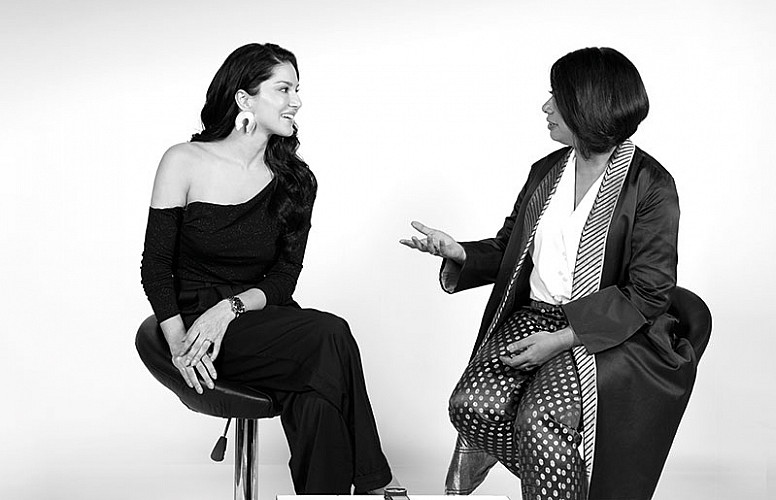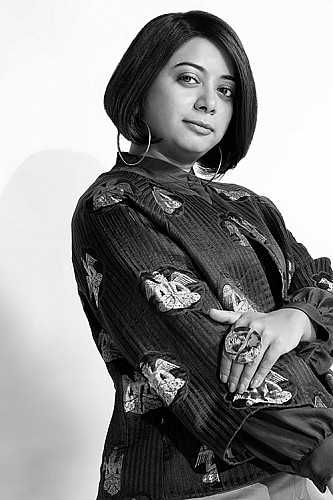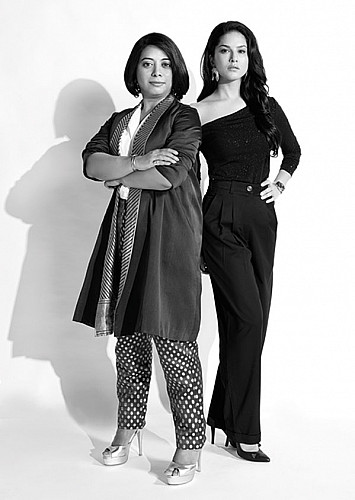Faye D’Souza And Sunny Leone Chat About Empowerment In The Context Of Indian Women

One of the first things Faye D’Souza and Sunny Leone remark on when we ask them to sit down with each other is what an odd combination they make. While they had never met and didn’t have a shared history, they certainly know how to create it, through their unapologetic approach to life.
D’Souza is one of the most recognisable faces on television today, but she didn’t explode onto our screens in a blaze of glory. Rather she made a quiet but impactful entry that got people to sit up and take notice. Although Mirror Now, where she is the executive editor, has slowly but steadily become a household name, it was one particular incident that stood out. During a panel discussion on sexism and women being picked on for what they wear, an annoyed Maulana Qasim asked D’Souza why she didn’t go to work dressed in her underwear to get the equality she was seeking. D’Souza did not launch into histrionics, but proceeded to calmly retort, ‘All you men think that if you rattle all women when they’re doing their jobs they will run back into their kitchens, they will cover themselves up, and leave the world again for you to conquer — I have news for you, we are not going anywhere…’ And suddenly, Indian television had a new hero. Her composure was a welcome counterpoint to those who believe that decibel levels equate good journalism, and her unflinchingly principled reportage on The Urban Debate won her the RedInk Journalist of the Year award in 2018.
Fast-forward to our meeting, and you can see her getting restless when a shot takes too long; as soon as we have a minute to spare, she grabs her phone scrolling to check “if anything significant has happened in the world”. Watching her in person enables you to see just what helped her climb the competitive media ladder so successfully — her impassioned interest in social issues combined with a sense of pragmatic optimism is a true antidote to the commercialised and cynical brand of journalism we are often served. D’Souza, on the other hand, is willing to fight her corners and is anchored in her convictions — two qualities that set her apart.
Leone shares D’Souza’s ability to remain unflustered in the face of blatant misogyny; just recall the poise with which she handled herself during that infamous vitriolic interview with journalist Bhupendra Chaubey. She admirably fielded a barrage of regressive and sexist questions (at one point, she was asked if he would become morally corrupt by talking to her). Karenjit Kaur Vohra — Leone’s real name — has managed to take controversies in her stride. The actor’s transatlantic crossover to Bollywood hasn’t been an easy ride, but her repertoire, which includes Jism 2, Ek Paheli Leela, Hate Story 2, Mastizaade, an awaited multilingual action film Veermadevi and an in-production biopic on her life, is consistently growing. Leone has also managed to find the time to launch her own cosmetics line called Star Struck by Sunny Leone. Veiled references to her previous careers in the adult entertainment industry and her erotic writings don’t faze her. After being trolled for supposedly refusing to kiss her co-stars in any film, Leone posted a cheeky picture of her in a lip lock with husband Daniel Webber. It was captioned, ‘Who said I don’t kiss on camera?’ From being in a position where other actors refused to share a stage with her at awards ceremonies to being selected by BBC as one of its 100 Most Influential Women list in 2016, she has crossed hurdles and shown much tenacity.
The woman at our shoot today is not the sultry siren, a mould that Leone is most commonly cast into. That’s not to say that she isn’t gorgeous, because she is, exquisitely so. But she is also elegant, funny, and honest about the changes to her routine that come with being a thrilled mum of three in the space of just eight months. “I sometimes have to just lock myself in a room and tell everyone to stay out for 10 minutes so I can do my eyebrows. I tell them it’s a forest up there,” she dead-pans. Her image and how it plays out in the public eye, she cannot control, but everything else in her life, she can and she does so with aplomb. As she succinctly told her over 12 million followers on Instagram, she is only guilty of doing it her way.
So, despite their unexpected pairing, we were hard-pressed to find a more empowering duo. As soon as they sit down opposite each other, they plunge into an in-depth conversation covering everything from sexual violence to the menace of online harassment. Here are a few excerpts from their insightful discussion.
On being a role model
FD: I’m so glad to finally meet you. We’ve been trying to meet for a really long time and, at Mirror Now, I work with some really lovely people who are big fans of yours, a lot of girls especially because you’re so outspoken and just come out and say whatever you want. I think you’re a role model for a lot of young girls. Do you find Indian girls and women quieter, more demure and less willing to honestly say what’s on their mind?
SL: I think it just depends on who you’re around — when you’re just with a bunch of girls you’re more than willing to speak up. I just feel that we’re now living in a society where we can say whatever we want now. But there are still a lot of women who don’t.
FD: I do have younger team members who’ve faced problems and who’ve come to me. There was one particular young reporter who was out on an assignment and was groped at a political gathering. She was upset and she called me. And I told her, listen, you have two options: you and I can go complain at the police station; I will come with you. But just because we are a channel that takes these things very seriously, I don’t want you to feel the pressure to lodge a complaint. So, if you choose not to that’s fine by me as well. I’m not going to judge you. Why don’t you take the evening and decide what you want to do and call me later. She called me the next day and said you know I woke up this morning and I’m more upset than I was yesterday and I want to complain. I said, “Okay, let’s go.”
On being a selfish generation
SL: You know since I live for a majority of the time here in Mumbai, going back to the US is always a little bit of a culture shock. You walk outside and there’s this girl in a tiny tank top and these little booty shorts and it’s not a big deal; boobs are not a big deal there. But I think India is absolutely amazing.
FD: I travel a lot, and I wish we had a slightly more open society. I might be way off base but I feel that in India, over the last three to four generations, every generation of women has taken us one step further. So, our mothers for example, went out to work for the first time. A lot of women in our generation are doing a job for the love of it. It’s a selfish decision, when women say, “I want to do this, because it makes me happy, because it gives me an identity. I’m not doing it to help out or to make money, it’s not one of those decisions. It’s about ‘me’.” A lot of guilt that comes with that decision. Our society, I believe, doesn’t allow women in our generation to just choose. So you’re either selfish for working, selfish for staying at home, selfish for being a working mom, selfish for being a single mom. No decision is good enough.
SL: Then I think we should just be the selfish generation.
FD: That’s fair, we could be selfish but I see a lot of working moms who are constantly feeling guilty. So if they are in the office they’re guilty because they’re feeling bad that they’re not spending enough time at home and when they’re at home, they feel bad that they skipped out on the office. How do you go through life with 20 years of guilt? It’s so unfair.
SL: I completely agree because I am actually feeling guilty right now.
FD: (exclaims) Are you feeling guilty right now?
SL: A little.
On what it takes to become a parent
FD: You’ve all of a sudden gone to becoming a mom of three.
SL: I know, who in their right mind does it, but my husband and I had three kids in eight months. Not one, but three.
FD: When was the last time you slept?
SL: Um, it was not last night. It’s been a while. I slept on the plane once in the last couple of months.
FD: So one girl and two boys?
SL: Yeah, twin boys and a little girl. I’ll never forget that India has given me my children.
FD: We do know that India’s adoption laws have changed and they’ve been updated in the last couple of years and become a lot more complex. Did you find that they are prohibitively complex or do you think it’s good for the children?
SL: I believe that in India there might be too many agencies. For Nisha, we went to St. Catherine’s Home in Mumbai. Our request was then forwarded to the Central Adoption Resource Authority (CARA) because we wanted Nisha to become an American citizen. I didn’t just pay some money and work my way through the system as celebrities are expected to; that didn’t happen. It took forever, almost two years, but I think if you really want a child and have that desperation to start a family, then you will work for it. You will fill up those one million forms that may not even be looked at. You have to go through the process, you have to go through the interview and you have to do whatever it takes. It is a really, really tough process, and the wait is quite excruciating.
FD: I think it’s good for the kids because that way they actually get to filter the people who are actually interested, because they’ll fall off the wagon eventually, they are not going to hang on for two years if they don’t really want to be a parent.

On being held accountable
SL: How do you choose the topics for your prime-time show?
FD: I have a team of very young people, which is different from a lot of the other television channels. We don’t have any sort of legacy journalists, no big names, no big faces, it’s just us. When we’re sitting around, we have a rule — we will never carry anything unless it has been verified twice over. We pick a story that matters to us, and what matters to us the most are things like the state of the roads; how much time you spend in traffic when you leave your house in the morning. What kind of air are you breathing, what kind of water do you have access to? What is the level of safety for children? What is the level of safety for women? So concerns like these take precedence over a lot of other news channels that are either speculating or just going after Pakistan every night. We try and be more responsible. There are always stories everywhere, there are constantly stories coming out in the country about women who are raped, women who are unsafe, about women who are getting trolled for no reason, there’s enough going on in the country. Initially, when we launched, we said we were not going to be covering politics at all, and people thought we would run out of topics to cover. Now I would love a day when we ran out of problems in India.
SL: I do believe that change happens one person at a time. I also think it happens when celebrities and women, like yourself, speak up and it reaches millions of people, whether it is through a news channel or an interview like this one.
FD: If one person sat up and said “Oh, she’s right”, it would be a great start”.
On rape laws in India
SL: Why does India not have stricter laws when it comes to sexual harassment and rape? Why do they not instil fear into young men?
FD: Actually, India has very strict laws; the Vishaka Guidelines for sexual harassment in the workplace are very strict; our rape laws have been amended after the Nirbhaya case. So the laws are fantastic, it’s the implementation of the laws that is really weak. It’s partly to do with culture, and partly to do with the fact that the entire system is misogynistic. So when a woman is raped, even in a city as modern and cosmopolitan as Mumbai, she has to go within 24 hours to a government hospital to get the rape kit test done. In many cases, the two-finger test is done, even though it’s banned — many doctors still do it, it’s horrific.
SL: (shudders) I’ve got goosebumps just thinking about it.
FD: I know. For some reason, earlier doctors felt they needed to test for virginity, in order to establish rape, which is completely pointless. But now although it’s banned it is still being done. Can you imagine that poor girl having to be violated all over again? These tests happen in really deplorable government hospitals that are in really bad conditions. A lot of times, the family and the girl wind up waiting for hours for the doctor to turn up. Then she’s not allowed to change her clothes or take a shower until after the test. It’s very uncomfortable, and the system is not kind to the survivor. A lot of times the girl tends to withdraw her complaint because it’s just too cumbersome. Even if the complaint is processed, the evidence is destroyed and people in powerful positions, who can wriggle their way out of it, do so. So the conviction rate in India is lower than 20 per cent, which means less than 1 in 5 cases actually sees conviction and even then it takes years and years to get a conviction for a rape case. And this happens in Mumbai, this is the case in Maharashtra, I’m not talking about UP, Rajasthan and Chhattisgarh where a lot of times the cases are not reported at all. They just chase them away if the girl is from a poorer family or a lower caste family. I think there’s so much work to be done yet to help women in this country with their rights.
SL: If the government or the police created a special unit of female nurses or doctors just for rape survivors, would it help? Having been raped, knowing that your life has changed within one second, and then to have to go through this process and still not feel safe is horrible.
FD: There are lots of solutions that are being looked at by the government; one of these are the Nirbhaya centres, which are crisis centres where a woman can go and get legal, mental and police help, but these have not been built yet. That’s the problem, they’re supposed to exist but it’s all on paper only. If we asked around this room, I bet a lot of women wouldn’t know that in any city, in any part of the country, no policeman can ever stop you and talk to you unless he has a female constable present — he cannot check if you’re driving drunk, ask you questions, come to your house or call you to the police station without the presence of a female officer. But the problem is that a lot of us still don’t know about all our rights.
SL: So what do you think is the solution?
FD: I think we need to make women more aware of their rights, partly through what we do, partly through what happens and is taught in school. We need schools to educate girls about their rights. We don’t tell our kids that it is their right to file an FIR, and that when they do so, they should get a copy of it from the cop, a copy of it has to be at a police station, and that they should take a copy home. So it is important to actually teach women and children their rights at all levels. In urban areas it is necessary to spread the word to people who work with and for us. This puts them in a position of power. We could tell them that “this is not okay, nobody is allowed to treat you this way, and these are the various options available to you”. The other thing, I believe, we should do as women is, whenever we see someone in distress, we should volunteer to accompany them to police stations. Say “I will come with you, you don’t have to be afraid, what’s happening to you is wrong. We will file that complaint, I will sit with you until it’s done, I will ask for the FIR copy and I will follow up on your behalf.”
SL: This is what I find too, women here don’t speak up. On account of the hierarchy that exists here, they feel like they’re beneath you and they get treated that way all day long, everywhere, whether that treatment is coming from a woman or a male or even some of the children in the house. They get treated like this, and yet they never speak. So you don’t even know if they have an issue.
FD: A lot of times, they take whatever is going on as normal, saying, “Oh, this happens in every house, every husband hits the wife, this is normal treatment, so why talk about it.” That’s one of the problems.
On the #MeToo movement
FD: What’s your reaction to the #MeToo campaign and why doesn’t Bollywood have one?
SL: The issue of sexual harassment is everywhere, and it’s not just about women getting targeted. There are men out there who have been affected too. I was on a shoot recently where one of my co-actors spoke about being sexually harassed. But I do believe that it’s sometimes harder for women to say, “Stop, what are you doing?” Or “What you’re doing is wrong, and you need to stop it right now”.
FD: And a lot of the times women don’t tell anybody, they just internalise it, take it home and live with it. I think that people like you can actually be the person that a younger, unsure person can come to.
SL: Have you ever gone through anything like that?
FD: Well, not personally, I think a lot of men are scared of me.
SL: (laughs) You’re all ‘Don’t mess with me’.
FD: I’m a walking-talking version of the Vishaka Guidelines! At least the cops in Mumbai have now started taking flashing, groping and molesting complaints more seriously. Because up until now they would say, “You know what I’m dealing with? Murder, drugs, and other serious things, so just knock it off”.
SL: I think that’s what #MeToo is about. More people speaking up will eventually make that man or woman think twice about their actions and try and control themselves, and not make that move on any woman (or man). I think that it not only gives women the power to speak up but also switches on that little red light somewhere in the offender’s head — ‘What if she goes and complains, because that’s what’s happening’.

On raising a daughter
FD: I remember that you once made a comment saying that the Indian film industry is more sexist than anything you’ve ever experienced overseas.
SL: (chuckles) I love how people make up stuff. I don’t think I used the word sexist. What I said was that India has been more accepting of me than any other place in the world. So I don’t know how the ‘sexist’ word came into play. What I did find is that in America, there is just as much conservatism that exists, and it’s in your face. I really believe that India is a lot more accepting than people give it credit for.
FD: That’s so good to hear! So obviously you’re raising a little girl now, which means you have that opportunity to pass on everything you’ve learnt and save her the trouble of having to learn it first-hand, so what would you like to hand over?
SL: I think the only way she’ll ever learn certain things is to go through them firsthand. I know that I can’t ever completely shield her from the world and as much as I would want to put her in a little bubble and just have her stay there, I can’t do it. I think the most important thing I could probably teach her is to be independent, to have her own opinions, to do what she wants to do as long as she’s not hurting someone, cheating someone, stealing or lying. But no matter what her choices are, my husband and I are going to try very hard to ensure that she’s a well-rounded young lady.
On staying true to yourself
FD: Trolling is something that I think we have in common. How do you deal with it?
SL: I want to say that I have the largest block list in India. I think as far as people go, if I see something nasty, if they’re writing something inappropriate, to me or my followers, then I block them. Especially if it’s to a girl or a woman. But no, it doesn’t affect me. Now, if your channel said something that wasn’t true or was hurtful then I’d be upset. I’d be like, ‘I liked you, you were so nice to me’.
FD: Do you find that people meet you and then turn around and say something nasty?
SL: Not so much now as when I first moved here. There are a couple of news channels and papers that I refuse to talk to. I hold grudges, it just happens, I’m sorry. People are nasty until they actually meet me and then they’re like, “Oh, you’re human?” And I’m like, “Yeah, I’m human, and I have feelings.”
FD: When you first came to India, you had to deal with all of this judgement. Did it affect you in any way?
SL: I understand that everybody is entitled to their own opinion and that is their life. But I wonder how people can make things up. People have said weird things like I’ve only been corrupting society since I got here. I got here only six years ago, so what was happening before that? Corruption from Sunny Leone only started six years ago!
FD: That’s ridiculous because look at the number of things these people would say have corrupted society — women wearing jeans, drinking alcohol. It circles back to misogyny.
Anything to do with a woman exercising her right to just do the things she wants to do, wear what she wants to wear, get a drink, smoke a cigarette, is corrupting society somehow. It’s terribly unfortunate, but there’s a certain nervousness that people have when women start to take control and say, “I’m just going to be who I want to be — just deal with it.”
Related posts from Verve:
Verve Trending
Sorry. No data so far.
us on Facebook to stay updated with the latest trends





